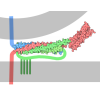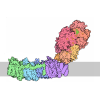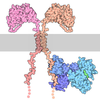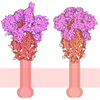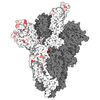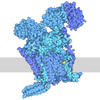+ Open data
Open data
- Basic information
Basic information
| Entry | Database: PDB / ID: 8rs9 | ||||||
|---|---|---|---|---|---|---|---|
| Title | p97 (VCP) double mutant - F266A F539A | ||||||
 Components Components | Transitional endoplasmic reticulum ATPase | ||||||
 Keywords Keywords | CHAPERONE / Hexameric complex / ATPase / Unfoldase / Protein Quality Control / Segregase | ||||||
| Function / homology |  Function and homology information Function and homology informationcytoplasmic ubiquitin ligase complex / flavin adenine dinucleotide catabolic process / VCP-NSFL1C complex / endoplasmic reticulum stress-induced pre-emptive quality control / endosome to lysosome transport via multivesicular body sorting pathway / BAT3 complex binding / cellular response to arsenite ion / protein-DNA covalent cross-linking repair / Derlin-1 retrotranslocation complex / positive regulation of protein K63-linked deubiquitination ...cytoplasmic ubiquitin ligase complex / flavin adenine dinucleotide catabolic process / VCP-NSFL1C complex / endoplasmic reticulum stress-induced pre-emptive quality control / endosome to lysosome transport via multivesicular body sorting pathway / BAT3 complex binding / cellular response to arsenite ion / protein-DNA covalent cross-linking repair / Derlin-1 retrotranslocation complex / positive regulation of protein K63-linked deubiquitination / cytoplasm protein quality control / positive regulation of oxidative phosphorylation / aggresome assembly / deubiquitinase activator activity / ubiquitin-modified protein reader activity / regulation of protein localization to chromatin / mitotic spindle disassembly / cellular response to misfolded protein / VCP-NPL4-UFD1 AAA ATPase complex / ciliary transition zone / positive regulation of mitochondrial membrane potential / vesicle-fusing ATPase / K48-linked polyubiquitin modification-dependent protein binding / regulation of aerobic respiration / retrograde protein transport, ER to cytosol / stress granule disassembly / NAD+ metabolic process / ATPase complex / regulation of synapse organization / ubiquitin-specific protease binding / ciliary tip / positive regulation of ATP biosynthetic process / MHC class I protein binding / ubiquitin-like protein ligase binding / RHOH GTPase cycle / polyubiquitin modification-dependent protein binding / autophagosome maturation / endoplasmic reticulum to Golgi vesicle-mediated transport / negative regulation of hippo signaling / HSF1 activation / interstrand cross-link repair / ATP metabolic process / translesion synthesis / endoplasmic reticulum unfolded protein response / proteasomal protein catabolic process / negative regulation of protein localization to chromatin / Attachment and Entry / Protein methylation / ERAD pathway / lipid droplet / proteasome complex / viral genome replication / Josephin domain DUBs / N-glycan trimming in the ER and Calnexin/Calreticulin cycle / macroautophagy / negative regulation of smoothened signaling pathway / establishment of protein localization / Hh mutants are degraded by ERAD / positive regulation of protein-containing complex assembly / Hedgehog ligand biogenesis / Defective CFTR causes cystic fibrosis / positive regulation of non-canonical NF-kappaB signal transduction / Translesion Synthesis by POLH / ADP binding / autophagy / ABC-family proteins mediated transport / cytoplasmic stress granule / Aggrephagy / azurophil granule lumen / positive regulation of protein catabolic process / Ovarian tumor domain proteases / KEAP1-NFE2L2 pathway / positive regulation of canonical Wnt signaling pathway / double-strand break repair / positive regulation of proteasomal ubiquitin-dependent protein catabolic process / E3 ubiquitin ligases ubiquitinate target proteins / cellular response to heat / site of double-strand break / Neddylation / secretory granule lumen / regulation of apoptotic process / protein phosphatase binding / ubiquitin-dependent protein catabolic process / ficolin-1-rich granule lumen / proteasome-mediated ubiquitin-dependent protein catabolic process / Attachment and Entry / ciliary basal body / protein ubiquitination / intracellular membrane-bounded organelle / protein domain specific binding / DNA repair / DNA damage response / ubiquitin protein ligase binding / Neutrophil degranulation / lipid binding / endoplasmic reticulum membrane / perinuclear region of cytoplasm / glutamatergic synapse / endoplasmic reticulum / ATP hydrolysis activity Similarity search - Function | ||||||
| Biological species |  Homo sapiens (human) Homo sapiens (human) | ||||||
| Method | ELECTRON MICROSCOPY / single particle reconstruction / cryo EM / Resolution: 3.4 Å | ||||||
 Authors Authors | Arie, M. / Matzov, D. / Karmona, R. / Szenkier, N. / Stanhill, A. / Navon, A. | ||||||
| Funding support |  Israel, 1items Israel, 1items
| ||||||
 Citation Citation |  Journal: iScience / Year: 2024 Journal: iScience / Year: 2024Title: A non-symmetrical p97 conformation initiates a multistep recruitment of Ufd1/Npl4. Authors: Michal Arie / Donna Matzov / Rotem Karmona / Natalia Szenkier / Ariel Stanhill / Ami Navon /  Abstract: experiments and cryo-EM structures of p97 and its cofactor, Ufd1/Npl4 (UN), elucidated substrate processing. Yet, the structural transitions and the related ATPase cycle upon UN binding remain ... experiments and cryo-EM structures of p97 and its cofactor, Ufd1/Npl4 (UN), elucidated substrate processing. Yet, the structural transitions and the related ATPase cycle upon UN binding remain unresolved. We captured two discrete conformations: One in which D1 protomers are ATP bound, while the D2 subunits are in the ADP state, presumably required for substrate engagement with the D2 pore; and a heterologous nucleotide state within the D1 ring in which only two NTDs are in the "up" ATP state that favors UN binding. Further analysis suggests that initially, UN binds p97's non-symmetrical conformation, this association promotes a structural transition upon which five NTDs shift to an "up" state and are poised to bind ATP. The UBXL domain of Npl4 was captured bound to an NTD in the ADP state, demonstrating a conformation that may provide directionality to incoming substrate and introduce the flexibility needed for substrate processing. | ||||||
| History |
|
- Structure visualization
Structure visualization
| Structure viewer | Molecule:  Molmil Molmil Jmol/JSmol Jmol/JSmol |
|---|
- Downloads & links
Downloads & links
- Download
Download
| PDBx/mmCIF format |  8rs9.cif.gz 8rs9.cif.gz | 708.8 KB | Display |  PDBx/mmCIF format PDBx/mmCIF format |
|---|---|---|---|---|
| PDB format |  pdb8rs9.ent.gz pdb8rs9.ent.gz | 568.7 KB | Display |  PDB format PDB format |
| PDBx/mmJSON format |  8rs9.json.gz 8rs9.json.gz | Tree view |  PDBx/mmJSON format PDBx/mmJSON format | |
| Others |  Other downloads Other downloads |
-Validation report
| Arichive directory |  https://data.pdbj.org/pub/pdb/validation_reports/rs/8rs9 https://data.pdbj.org/pub/pdb/validation_reports/rs/8rs9 ftp://data.pdbj.org/pub/pdb/validation_reports/rs/8rs9 ftp://data.pdbj.org/pub/pdb/validation_reports/rs/8rs9 | HTTPS FTP |
|---|
-Related structure data
| Related structure data |  19473MC  8pqxC  8r0eC  8rsbC  8rscC M: map data used to model this data C: citing same article ( |
|---|---|
| Similar structure data | Similarity search - Function & homology  F&H Search F&H Search |
- Links
Links
- Assembly
Assembly
| Deposited unit | 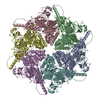
|
|---|---|
| 1 |
|
- Components
Components
| #1: Protein | Mass: 89284.633 Da / Num. of mol.: 6 Source method: isolated from a genetically manipulated source Source: (gene. exp.)  Homo sapiens (human) / Gene: VCP, HEL-220, HEL-S-70 / Plasmid: pQE9 / Production host: Homo sapiens (human) / Gene: VCP, HEL-220, HEL-S-70 / Plasmid: pQE9 / Production host:  Has protein modification | N | |
|---|
-Experimental details
-Experiment
| Experiment | Method: ELECTRON MICROSCOPY |
|---|---|
| EM experiment | Aggregation state: PARTICLE / 3D reconstruction method: single particle reconstruction |
- Sample preparation
Sample preparation
| Component | Name: Tertiary complex of the hexameric p97 F266A F539A double mutant Type: COMPLEX Details: The mutant generated by the replacement of phenylalanine to alanine at positions 266 and 539. Entity ID: all / Source: RECOMBINANT | ||||||||||||||||||||
|---|---|---|---|---|---|---|---|---|---|---|---|---|---|---|---|---|---|---|---|---|---|
| Molecular weight | Value: 0.53 MDa / Experimental value: NO | ||||||||||||||||||||
| Source (natural) | Organism:  Homo sapiens (human) Homo sapiens (human) | ||||||||||||||||||||
| Source (recombinant) | Organism:  | ||||||||||||||||||||
| Buffer solution | pH: 7.5 | ||||||||||||||||||||
| Buffer component |
| ||||||||||||||||||||
| Specimen | Conc.: 7 mg/ml / Embedding applied: NO / Shadowing applied: NO / Staining applied: NO / Vitrification applied: YES | ||||||||||||||||||||
| Specimen support | Grid material: COPPER / Grid mesh size: 200 divisions/in. / Grid type: Quantifoil R2/2 | ||||||||||||||||||||
| Vitrification | Instrument: FEI VITROBOT MARK IV / Cryogen name: ETHANE / Humidity: 100 % / Chamber temperature: 277.15 K Details: pre-blotting incubation time of 20 secounds and blot for 3.5 seconds with -1 blot force |
- Electron microscopy imaging
Electron microscopy imaging
| Experimental equipment |  Model: Titan Krios / Image courtesy: FEI Company |
|---|---|
| Microscopy | Model: FEI TITAN KRIOS |
| Electron gun | Electron source:  FIELD EMISSION GUN / Accelerating voltage: 300 kV / Illumination mode: FLOOD BEAM FIELD EMISSION GUN / Accelerating voltage: 300 kV / Illumination mode: FLOOD BEAM |
| Electron lens | Mode: BRIGHT FIELD / Nominal defocus max: 2000 nm / Nominal defocus min: 800 nm / Cs: 2.7 mm |
| Specimen holder | Cryogen: NITROGEN |
| Image recording | Electron dose: 38 e/Å2 / Film or detector model: GATAN K3 (6k x 4k) / Num. of real images: 11902 |
- Processing
Processing
| EM software |
| ||||||||||||||||||||||||||||||||||||||||
|---|---|---|---|---|---|---|---|---|---|---|---|---|---|---|---|---|---|---|---|---|---|---|---|---|---|---|---|---|---|---|---|---|---|---|---|---|---|---|---|---|---|
| CTF correction | Type: PHASE FLIPPING AND AMPLITUDE CORRECTION | ||||||||||||||||||||||||||||||||||||||||
| Particle selection | Num. of particles selected: 3005242 | ||||||||||||||||||||||||||||||||||||||||
| Symmetry | Point symmetry: C6 (6 fold cyclic) | ||||||||||||||||||||||||||||||||||||||||
| 3D reconstruction | Resolution: 3.4 Å / Resolution method: FSC 0.143 CUT-OFF / Num. of particles: 79612 / Symmetry type: POINT | ||||||||||||||||||||||||||||||||||||||||
| Atomic model building | B value: 111 | ||||||||||||||||||||||||||||||||||||||||
| Atomic model building | PDB-ID: 5FTN Accession code: 5FTN / Source name: PDB / Type: experimental model | ||||||||||||||||||||||||||||||||||||||||
| Refinement | Stereochemistry target values: GeoStd + Monomer Library + CDL v1.2 | ||||||||||||||||||||||||||||||||||||||||
| Displacement parameters | Biso mean: 117.27 Å2 | ||||||||||||||||||||||||||||||||||||||||
| Refine LS restraints |
|
 Movie
Movie Controller
Controller









 PDBj
PDBj

